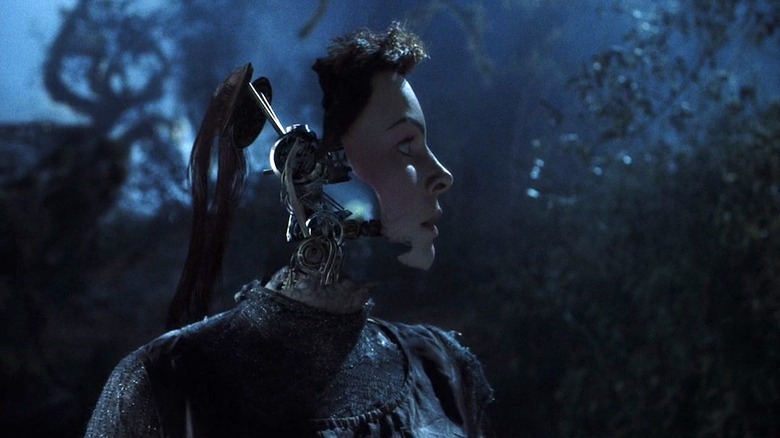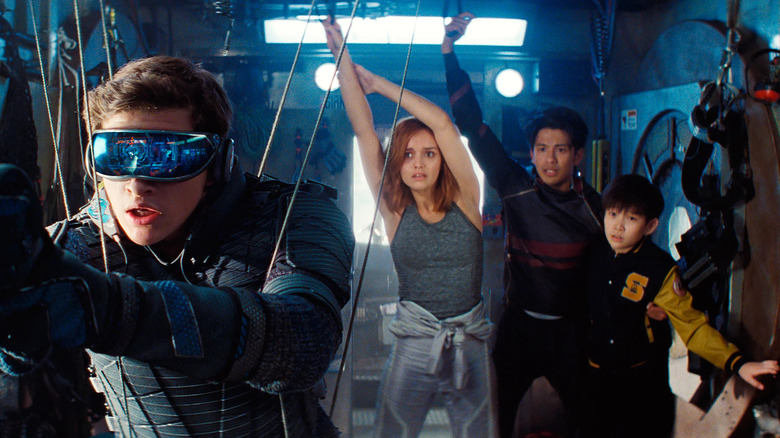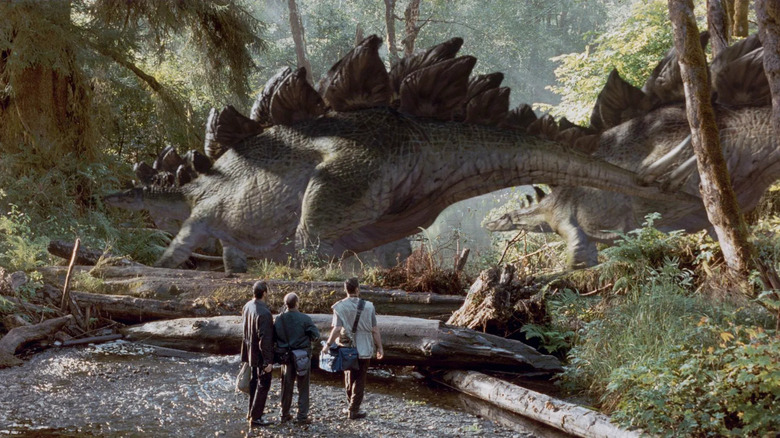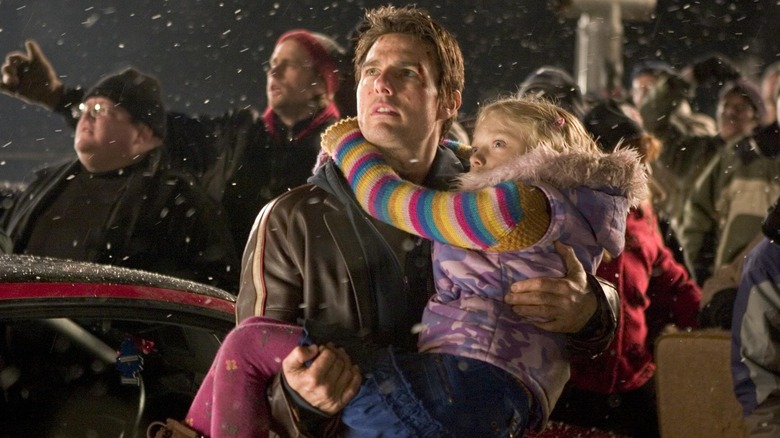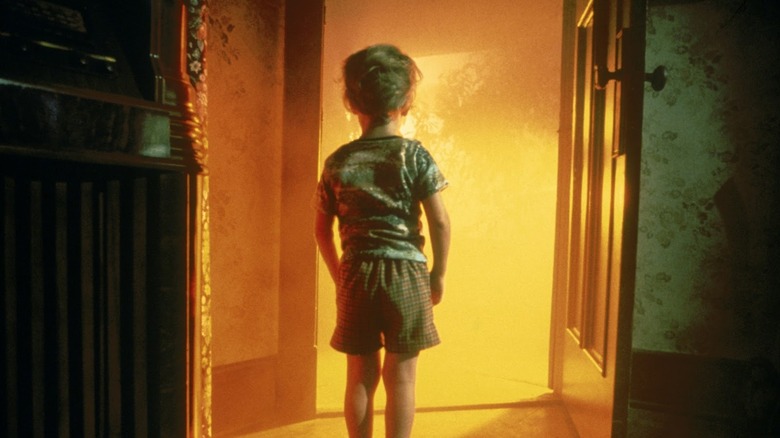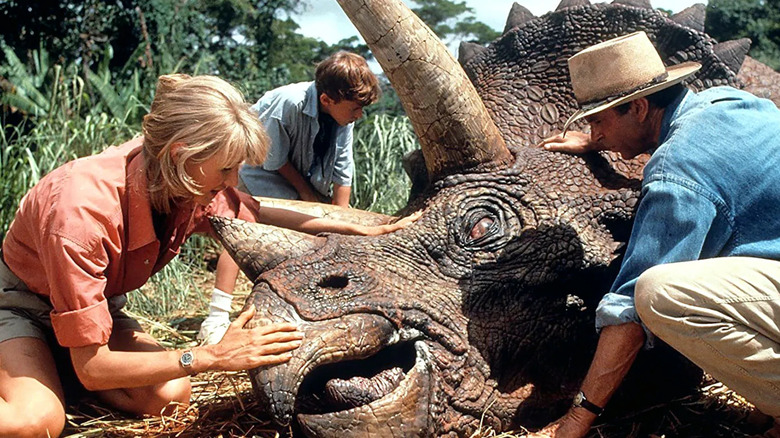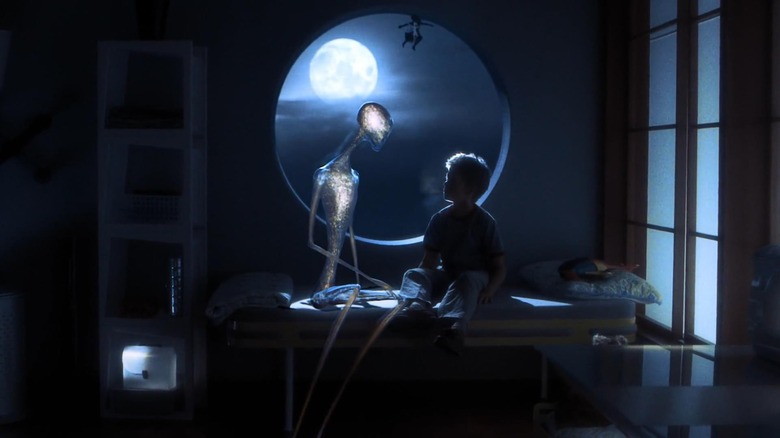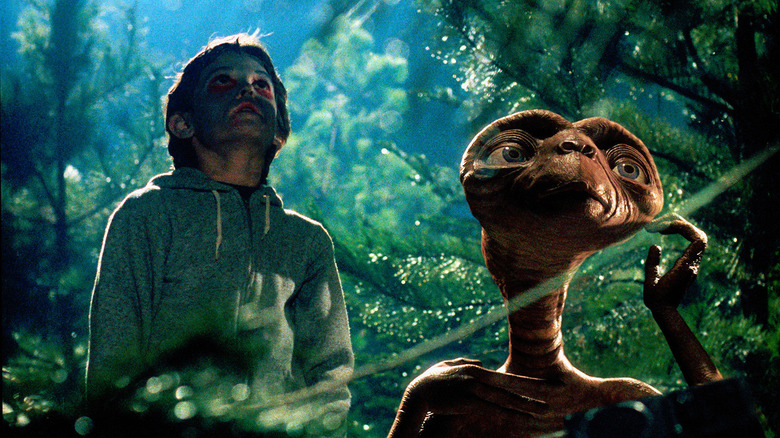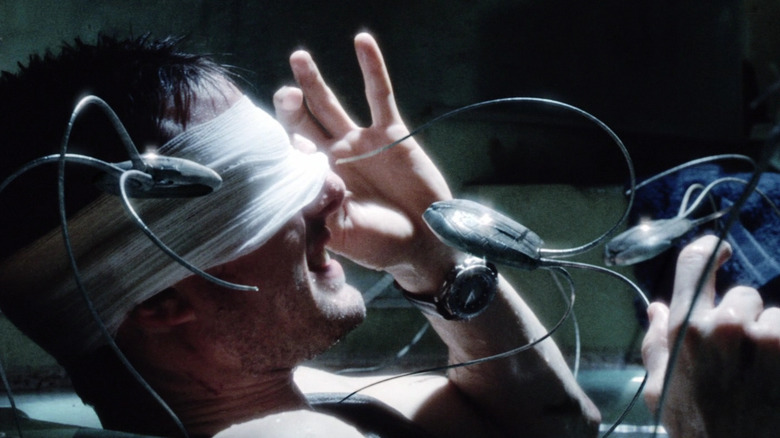All Eight Steven Spielberg Sci-Fi Movies, Ranked
The evolution of Steven Spielberg's career has been fascinating to witness. After establishing what modern blockbusters look like with the 1975 animal attack movie "Jaws," he went on to pioneer a slick, audience-rousing style of adventure filmmaking that is venerated and imitated to this day. Along the way, he repeatedly indulged in high-end prestige fare, creating stories that depicted the world's most grievous injustices with compassion and sensitivity ("Schindler's List," "The Color Purple"). In his most recent era, Spielberg alternated between tech-forward genre/adventure films and social justice dramas that used historical events to address recent political issues.
Eight times in his career, Spielberg has returned to science fiction explicitly, and he tends to view the genre as pliable; he typically uses fantastical elements to explore the more emotional and sentimental facets of humanity. Spielberg is a sentimental filmmaker, and enjoys the warmth of humanity over the coldness of pure cinematic craftsmanship. Reportedly, he and Stanley Kubrick admired one another, and the two could not be different in their respective operational ethos.
Below are the eight science fiction films Spielberg made in his career to date, ranked from worst to best. At least one, as the reader will discover, is a legitimately terrible movie.
8. Ready Player One (2018)
An embarrassing Gen-X pop culture orgy of braindead onanism, "Ready Player One," based on the novel by Ernest Cline, takes place in a futuristic world where a singular virtual reality program called the OASIS has overrun the world. The outside world is filthy and overpopulated, but in the OASIS, players are encouraged to construct fantasy avatars out of recognizable, corporate-owned pop culture figures. From Buckaroo Banzai to Battletoads, from Chucky to the Iron Giant, everyone can be whoever they want. Their choices are inspired by the interests of the dead Gen-X computer programmer who invented the OASIS, giving all the white men of a certain age a smug sense of superiority. "Ready Player One" is an act of enjoying one's own ambrosial methane emissions.
The story involves a young player attempting to beat a quest within the OASIS so that he may become its owner and have a lot of money. The central conflict of "Ready" seems to be between one "benevolent" corporation and an "evil" one that wants to run ads. The heroes repeatedly pledge corporate fealty to their selected pop culture masters, and never once seem to question that fealty to the company that owns the OASIS might not be at all healthy.
Worst of all, Spielberg doesn't seem to recognize any of this, using his film to explore filmmaking tech and cutesy references rather than get to the heart of the story. It's a stultifying film that argues in favor of being branded. It's not only Spielberg's worst sci-fi movie, it's his worst movie period.
7. The Lost World: Jurassic Park (1997)
Although "The Lost World: Jurassic Park" arrived four years after the original "Jurassic Park," it reeks of being rushed. Lacking in the original film's sense of awe and wonderment, "The Lost World" is an uneven mixture of wilderness adventure, cautionary tale, and muddy messages. Did we really return to Jurassic Park to learn the same lesson again that it's not nice to mess with mother nature? Additionally, the conceit of the film felt contrived immediately: Evidently, far away from the locations seen in "Jurassic Park" was a secondary island where even more dinosaurs were being resurrected in a lab, making for a wild island that would be infiltrated for plot-related reasons.
The first "Jurassic Park" was a special effects bonanza, using state-of-the-art VFX technology to make dinosaurs look more real than they ever had before. The effects in "The Lost World" are just as impressive, but the light premise or the original had already worn thin, there was no sense of mystery, and ultimately the film felt silly and hackneyed. The final scenes wherein a Tyrannosaurs-rex is loose in San Diego provide something of a campy thrill, but the absurd notion that a dinosaur mysteriously piloted a ship into a harbor — like in "Dracula" — undercut any wonderment the audience had.
It's hard not to think that Spielberg really, really didn't want to make this movie.
6. War of the Worlds (2005)
There are two ways one can watch Spielberg's 2005 remake of "War of the Worlds." One can see it as a story of post-9/11 heroism wherein ordinary dads can, in a crisis, become the saviors their children require, extracting from within themselves a renewed sense of family and drive sparked by a major disaster. Or one can see it as a deliberately pathetic fantasy wherein a loser dude (Tom Cruise) fantasizes about the kind of world crisis that would need to occur for him to re-earn the respect of his two children. When one is powerless, one envisions a world where one might have power. That could be what the Cruise character does in "War of the Worlds." He imagines an alien invasion wherein he would have the heroism and the wherewithal to survive.
In 2005, the world was still deciding how to move forward with widespread destruction on screen, weighing whether or not it was appropriate to fictionally attack cities after the real thing had already occurred. As such, the violence in "Worlds" feels terse, brutal, not fun or fantastical. Watching Spielberg war with his need to be entertaining and his need to address the real world is fascinating, but it doesn't make for a particularly entertaining movie.
5. Close Encounters of the Third Kind (1977)
It wouldn't be until the 1987 publication of Whitley Streiber's book "Communion" that the lore of alien abduction would be properly codified as urban legend, but in 1977, Spielberg certainly kicked a few doors open with his fascinating, tense, and ultimately unfocussed film "Close Encounters of the Third Kind." In it, a hapless suburban father — hapless, inattentive, or absent fathers would prove to be a common theme in Spielberg's work — finds that he might have seen a UFO while investigating a power out. Shortly thereafter, he begins sculpting facsimiles of The Devil's Tower in Wyoming, knowing that it "means something."
There are many scenes of investigation, a lot of mysterious government cover-ups, and many other things that would eventually become second nature to viewers of "The X-Files." "Close Encounters" climaxes with a fun attempt to communicate with aliens, followed by a disappointing conclusion wherein humans are returned to Earth after being kidnapped. Rather depressingly, Spielberg justifies the departure of a father from his family under the explanation that he had more important things to do. Released at a time when divorce rates were rising in the United States, this seemed like an irresponsible justification for "Close Encounters" to make.
"Close Encounters" was a massive hit, and might have been the first feature film to enjoy a "director's cut" re-release, codifying the notion that no film is a final draft.
4. Jurassic Park (1993)
"Jurassic Park," although itself a gigantic corporate blockbuster, is sneakily a film that lambastes corporate theme parks. Daring, given that Universal Pictures famously advertises its parks at the conclusion of each of its movies. Many audiences were dazzled by "Jurassic Park" when it first opened, astonished by the film's groundbreaking special effects to make dinosaurs look as real as possible. The dinosaurs in question, however, were immediately commodified and placed in a high-tech zoo intended for ogling by the public. Naturally, the dinosaurs break loose and prove that theme parks are no place for genetic tampering. It's the attack on safe, colorful, commercialized entertainment that the dinosaurs ultimately commit; it's no coincidence that the film's dino climax takes place in a gift shop.
The science in "Jurassic Park" is, of course, mostly bunk, but Spielberg has a canny knack for making it sound plausible. It's the kind of science fiction that makes real-life science seem more exciting, enticing young people to enter the field of paleontology.
And, of course, many loved the little-kid-friendly dinosaur thrills. There's a telling moment when Dr. Grant (Sam Neill) looks at a triceratops and quietly admits that it was always his favorite dinosaur when he was a little boy. That was what the kids in the audience felt.
3. A.I. Artificial Intelligence (2001)
The most unusual film in Spielberg's entire filmography is handily 2001's "A.I. Artificial Intelligence," a project he took over from Stanley Kubrick when the latter passed away. "A.I." was a turning point for Spielberg creatively, as it looked and felt unlike any of the films he had made prior, emulating the long takes and more craft-minded camera setups that Kubrick may have employed. Additionally, "A.I." is a thoughtful movie, attempting to look at the world through a robot's eyes, a robot who is only programmed with a limited understanding of humanity. More than anything it wants to love its mother.
In the near future, intelligent robots walk among us, able to emulate human behavior, but only capable of simulating human emotions. A new kind of robot is built that can indeed experience love, and the 'bot (played by Haley Joel Osment) finds itself standing in for a comatose son in the mansion of a wealthy couple. The robot falls in love with his "mother" (Frances O'Connor). When the comatose son recovers, his mother abandons her robot son in the woods, and the boy spends the remainder of the film seeking the fictional blue fairy at the end of "Pinocchio" in hopes that his wish to be reunited will be granted. "A.I."'s coldness serves in its favor, letting the audience sympathize with the robot boy while still understanding its emotional and cognitive limitations as an artificial being.
The conclusion is hard to predict, tragic, cathartic, and looks at the dying days of humanity. "A.I." is one of Spielberg's more ambitious movies.
2. E.T. the Extra-Terrestrial (1982)
At its heart, Spielberg's Best Picture-nominated 1982 film "E.T. the Extra-Terrestrial" is about divorce. Many kid-friendly adventure films in the late '70s and early '80s were about kids having adventures on their own, free from the oversight of parents, often left seeking an absent father figure. Like "Close Encounters," "E.T." takes place in a world where fathers will leave. "E.T." takes the more compassionate route, providing its young hero (Henry Thomas) with an ersatz father figure in the form of a strange-looking, long-necked alien botanist from beyond the stars. Not only will Thomas learn to care for the alien, but he also becomes somehow psychically linked with it, expanding his sense of empathy. This link will prove both emotionally harrowing, but also comedic — as when the alien (voiced by Pat Welsh) cracks into mom's supply of Coors.
"E.T." is also a triumph of music, as John Williams' score does more storytelling than the visuals: An amusing 2011 YouTube video removed Williams' music from the climax of "E.T.," leaving it awkward and matter-of-fact.
"E.T." is Spielberg the sentimentalist at his finest, showing that aliens could be warm, humane creatures that can serve as a balm for hurting children and broken homes. There may be a palpable reason that it was initially more widely welcomed than John Carpenter's more apocalyptic alien invasion film "The Thing" from the same year.
1. Minority Report (2002)
Based on the classic 1956 novella, "Minority Report" is sci-fi speculation at its most exciting. In the near future, humanity has produced a trio of psychics who can, with 100% accuracy, predict the future. The three siblings have been drafted into working for the Department of Pre-Crime, wherein cops — using advanced computer technology — can see murders prior to their happening, and run across town to arrest the perpetrators before they do anything. It's less-than-vaguely fascistic and will prove to have loopholes when star cop John Anderton (Tom Cruise) becomes embroiled in a pre-crime mystery.
"Minority Report" is heady as it is thoughtful, expertly building a world that operates impeccably by its own rules. And Spielberg handily provides some old-fashioned sci-fi matinee thrills as well; The scene wherein Cruise drives off in a car that was built around him on an assembly line is as exciting as anything in "Raiders of the Lost Ark."
One can see Spielberg having matured to a new plane with "Minority Report." He was no longer interested in the adventure trappings of the genre, eager to explore some of the more philosophical concepts that technology and evolution may provide for the future of our species. It's no wonder that when he makes a film like "Ready Player One," he seems so disengaged. With "Minority Report," the script had ideas he could sink his teeth into.
